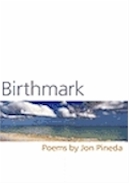|
Web Del Sol presents Jon Pineda as a Featured Poet for the 2005 National Poetry Month. The Poetry Chapbook My Sister, Who Died Young, Takes Up The Task On The Nature Of
Things: An Apology For The Starlings
|
No matter
what path it takes, though, the world of the poem—its
sounds and turnings and intimacies and actions and communions— eventually
ends, and there, waiting for you, is that inevitable silence all readers
My Sister, Who Died Young, Takes Up The Task
and my sister, entering the room quietly, of peeling slowly away the blemished skins, She makes sure to carve out the mealy flesh. would love to save everything. She smiles at me, domed with thin slices she brushes into What can I do? I ask finally. Nothing, Jon Pineda is the author of BIRTHMARK (Southern Illinois University Press, 2004), winner of the Crab Orchard Award Series in Poetry Open Competition. A recipient of a Virginia Commission for the Arts Individual Artist Fellowship, he is a graduate of James Madison University and of the MFA program in creative writing at Virginia Commonwealth University, where he received an AWP INTRO Award for Poetry. His recent work has appeared in PRAIRIE SCHOONER, SOU'WESTER and various anthologies. website: http://www.jonpineda.com/ Email Jon Pineda: info@jonpineda.com
|
Jon Pineda's
Birthmark is one of those rare first books that will make its mark
on their generation just as James Tate's The Lost Pilot and Tony
Hoagland's Sweet Ruin had on their peers. These masculine poems explore
the father/son dynamic in a mixed race context. The son is half Filipino
and half white and this cultural conflict colors his interaction with his
family members and the white American society of Hampton Roads, Virginia.
This is a book which many poetry anthologists will turn to for years to
come.
In this elegiac first book, memory takes the shape of a swimming lesson
and of a house made of doors. Loss takes the shape of a scar, intimacy
of a birthmark. Whatever marks a life changes, in the alchemy of this
poet’s language and vision, to moments that open, beyond coming and going,
into the present. These are poems of great tenderness and grace.
Jon Pineda's first book is brimming with a wisdom that seems not contrived from literary ambition, but born of a joy for life quite incidental to such ambition. It is the wisdom of Telemachus, the prototypical son, gained from long hours contemplating the missing father, then reconciling to the father's return. It is a wisdom that begets tenderness, and broadcasts, with strength and humility, a vision of contraries reconciled at the core of longing. Birthmark is a fine and absorbing book, I'm sure the first of many. —Richard Katrovas
|

